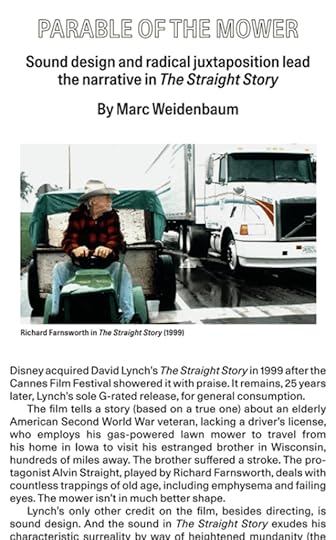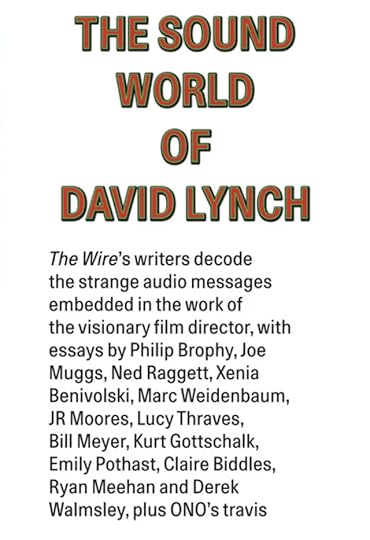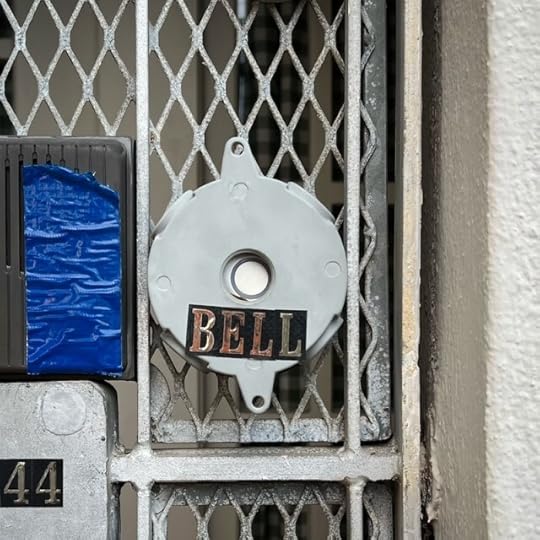Marc Weidenbaum's Blog, page 55
July 8, 2024
The Many Shades of “Axel F”
While under the weather over the weekend, I watched a bunch of movies, including Beverly Hills Cop: Axel F. I was never particularly into Eddie Murphy, as something of a non-comedic-oriented consumer of pop culture, but if you’re Gen X, as I am, then the Pointer Sisters’ “Neutron Dance” has a power not unlike the role “All Along the Watchtower” played for Gen C (by which, of course, I mean Cylons). (Murphy, by the way, is quite something in the movie, fully in control of manner in which he navigates and comments on generational and racial divides.)
For a weekend spent largely in bed, the new one hit the spot pretty solidly, but the main thing I want to note is how effectively it did what so many movies and TV shows do (I’m looking at you, The Detectorists and Succession), which is to repeatedly redeploy the theme melody over and over, and to do so in different ways as a means to serve as the backing score to different scenes with varying emotional and narrative states. One might even draw a comparison between the way the riff changes throughout the movie and the “code-switching” that is referenced in a scene when a valet parking attendant suddenly adopts a British accent to deal with a regular.
Apparently the film’s composer, the prolific Lorne Balfe (Mission: Impossible – Dead Reckoning Part One, Dungeons & Dragons: Honor Among Thieves, Ambulance), did some tech-historical research to accomplish what he was after. Writes Drew Taylor at thewrap.com:
“Balfe worked with the Vintage Synthesizer Museum, located in the Highland Park neighborhood of Los Angeles, to source the instruments and to find players who could operate them. ‘It’s like an archeological deep-dive of finding out what the sound was, recreating the patches, trying to get it back to how it did sound originally,’ Balfe said.”
The theme in question is, of course, the indelible “Axel F,” composed by Harold Faltermeyer for the very first Beverly Hills Cop, back in 1984. The Vintage Synth Museum is a fantastic resource. It used to be in Oakland, for eight years, before relocating to Los Angeles at the end of 2021.
Framed

These two sizable, nearly 6’ tall, cement posts frame the space that will soon enough hold, presumably, a brand new sign identifying this spot on the San Francisco coast as China Beach. For the time being it frames the view as you approach.
July 7, 2024
Sonic Storytelling in The Straight Story
Articles rarely carry titles written by their authors. My longtime favorite assigned to me was “About Face,” about the type foundry and magazine Emigre. Then came “The Man Who Fell for Earth,” an interview I did with science fiction author and environmentalist Kim Stanley Robinson. The crown has been passed to “Parable of the Mower,” on David Lynch’s 1999 movie, The Straight Story, which came out in between Lost Highway (1997) and Mulholland Drive (2001).

That’s in the new issue of The Wire, which has a special section dedicated to David Lynch’s work. It’s packed with cool stuff, like the role of finger snapping, backward speech, the wind, and other sonic elements — and of course, his scores.

July 6, 2024
Scratch Pad: 4th, Bear, Unwilling
I do this manually at the end of each week: collating most of the recent little comments I’ve made on social media, which I think of as my public scratch pad. I mostly hang out on Mastodon (at post.lurk.org/@disquiet), and I’m also trying out a few others. And I take weekends off social media.
▰ It’s that time of year when one finds oneself explaining, “Being interested in fireworks isn’t the same as enjoying them.”
▰ There’s even more silence in season 3 of The Bear than in previous seasons. It’s become a moody soap opera, concerned with the characters’ lives rather than with any plot beyond basic goals (a star) and hurdles (money). A highlight is in episode 5, when Marcus turns on his recently deceased mother’s medical devices for the comfort of the beeping.
▰ Browser tabs are the pile of dirt left over when you go down a rabbit hole
▰ Listening to noise drone music while writing makes my life feel way more dramatic than it is
▰ Title of a panel discussion for music educators in 1970

▰ The foghorns this morning certainly seem to be glad to have yesterday’s fireworks behind them — which I now realize is also a joke, ’cause the fireworks were literally behind the fog yesterday, as is pretty much always the case here on the 4th of July
▰ My daily life is evidence that this sound cue can be factually accurate yet say nothing meaningful about what is actually occurring

▰ Heck yeah I preordered that China Miéville + Keanu Reeves novel
▰ My MacBook Pro and my iPhone are up to date software-wise, and yet regularly my Voice Memos and Notes won’t sync between them. What is up with that?
▰ How many minutes before a late meeting finally starts before Fugazi’s “Waiting Room” starts playing in your head?
July 5, 2024
Let’s Twist Again

I didn’t have a ton of interest in the new movie Twisters, but the sound design of the trailers makes a compelling argument that it will, in fact, be a breakout hit in civic-alarm-system fandom, of which I’m a card-carrying member.
July 4, 2024
Disquiet Junto Project 0653: Break a Rule

Each Thursday in the Disquiet Junto music community, a new compositional challenge is set before the group’s members, who then have five days to record and upload a track in response to the project instructions.
Membership in the Junto is open: just join and participate. (A SoundCloud account is helpful but not required.) There’s no pressure to do every project. The Junto is weekly so that you know it’s there, every Thursday through Monday, when your time and interest align.
Tracks are added to the SoundCloud playlist for the duration of the project. Additional (non-SoundCloud) tracks also generally appear in the lllllll.co discussion thread.
Disquiet Junto Project 0653: Break a Rule
The Assignment: Stop doing something you always do.
Step 1: Thinks of things you consider unbreakable rules when you make music. Maybe you never use a vocal, or you always use a click track, or you never remake earlier work, or you always use a specific instrument. The longer you think about these rules, the more you’ll unearth rules that you hadn’t even recognized as rules before.
Step 2: Make a list of the self-imposed rules you came up with in Step 1.
Step 3: Choose one rule from Step 2 and record a track in which you break that rule.
Tasks Upon Completion:
Label: Include “disquiet0653” (no spaces/quotes) in the name of your track.
Upload: Post your track to a public account (SoundCloud preferred but by no means required). It’s best to focus on one track, but if you post more than one, clarify which is the “main” rendition.
Share: Post your track and a description/explanation at https://llllllll.co/t/disquiet-junto-project-0653-break-a-rule/
Discuss: Listen to and comment on the other tracks.
Additional Details:
Length: The length is up to you.
Deadline: Monday, July 8, 2024, 11:59pm (that is: just before midnight) wherever you are.
About: https://disquiet.com/junto/
Newsletter: https://juntoletter.disquiet.com/
License: It’s preferred (but not required) to set your track as downloadable and allowing for attributed remixing (i.e., an attribution Creative Commons license).
Please Include When Posting Your Track:
More on the 653rd weekly Disquiet Junto project, Break a Rule — The Assignment: Stop doing something you always do — at https://disquiet.com/0653/
July 3, 2024
This Week in Sound: The White Noise of Domestic Life

These sound-studies highlights of the week originally appeared in the July 2, 2024, issue of the Disquiet.com weekly email newsletter, This Week in Sound. This Week in Sound is the best way I’ve found to process material I come across. Your support provides resources and encouragement. Most issues are free. A weekly annotated ambient-music mixtape is for paid subscribers. Thanks.
▰ COLD OPEN: When asked what I listen to, my usual response is to qualify that mostly I listen to the equivalent of refrigerators humming — so you can bet that I’m already deep into Nicola Twilley’s new book, Frostbite: How Refrigeration Changed Our Food, Our Planet, and Ourselves. It’s as full of hums as my record collection, and of tantalizing observations such as the following item, which appears as a footnote far into the volume: “This low hum actually vibrates around sixty hertz, due to minute fluctuations in the grid as utility companies respond to changes in demand. The result is an ever-shifting symphony of frequency vibrations that London’s Metropolitan Police began to record in 2005 for use in audio forensics. Because the hum is so omnipresent, inserting itself into most recordings, law enforcement can match the particular sixty-hertz fingerprint of UK-made recordings to its archive to arrive at an exact time stamp. Every time you open the fridge door (which the average household does 107 times per day, according to research conducted by LG), triggering its compressor to kick on, you’re helping create that particular second’s unique audio fingerprint.” The footnote is connected to a sentence observing that the hum of refrigerators has “slipped beneath our perception threshold to become the white noise of domestic life.”
▰ ANTI UP: “When considered on a national level, noise just doesn’t compete against other environmental problems for emotional intensity,” says Earth Day organizer Denis Hayes. He’s quoted in an article — originally in Undark, and then picked up by NPR — about a current lawsuit: “an anti-noise advocacy group, Quiet Communities, sued the Environmental Protection Agency for not doing its job to limit the loud sounds people are exposed to in everyday life. The group is now waiting to hear if it will be able to argue its case in front of the U.S. District Court for the District of Columbia.” The piece, by Joanne Silberner, is a primer on the health threats inherent in noise:
“noise increases the risk of death from coronary artery disease by about 5% for every 10 A-weighted decibel, or dBA, increases in traffic noise exposure”“Traffic noise in Western Europe causes the loss of 1.6 million healthy years of life annually.”“the last time EPA estimated noise exposure” was 1981“Planners have been routing highways through under-resourced neighborhoods for decades”The last time the EPA suggested any noise limits was in 1974, before the health effects were well known. (Thanks, Mike Rhode!)Related, from the LA Times: “Pedestrians are twice as likely to be hit by an electric or hybrid car than by a vehicle that runs on gasoline or diesel. … [R]esearchers hypothesize that the relatively quiet operations of an electric vehicle is the key factor.”
▰ WAKE-UP CALL: I have on occasion found myself in a hotel room for which I was not the intended sort of guest, specifically those with oversized bathrooms with wide doors and wall to wall tile, designed for visitors in wheel chairs and with other support needs. Those showers, I’ve learned, are called “roll-in.” I have gotten them, in the past, when booking a room quite late — like the day before — at which point the hotel must have decided no one actually needing it is likely to arrive. New to me is the “hearing accessible” hotel room, such as one at a hotel south of where I live, in Menlo Park. I trust — or hope — that people who would benefit from such rooms are aware of them, and that they are becoming more common. This place advertises:
strobe lightTTY device doorbellADA approved telephone▰ ORIENT EXPRESS: How it is that fish know where sound comes from? (Starts at 9:21 in the podcast.) Due to how sound moves underwater, fish have evolved to hear differently than humans do. How exactly that functions, and why it has been a difficult topic to pursue, is the topic of a segment in the Nature Podcast. (Thanks, Rich Pettus!)
▰ SOUND BITES: Tone LoC: The Library of Congress, on how it preserves sound recordings (thanks, Mike Rhode!). ▰ Dive In: Tribeca Festival Immersive Curator Ana Brzezińska on learning to appreciate immersive sound. ▰ Bugged Out: Tips on how to deal with overwhelming cicada songs. ▰ Ray Ban: A StingRay device for spying on cellphones was up for sale (for $100,000) on eBay before it was reportedly taken down by the auction company. ▰ Horn Dog: This moose may love wind chimes as much as I do (Instagram). ▰ Hops to It: The magazine Print picked up the story about the Leffe sound brand: “Developed by recording the acoustics within the original Leffe Abbey in Belgium — home to monks since 1240 — the sound of a bursting balloon in the Abbey was transformed into a digital reverb, creating a unique and recognizable sonic signature.”
On the Line: Subway, Blind, Stereotypes
▰ WRONG TRACK:
“I just equated it to this phantom noise, and maybe we’re all in a mass hysteria moment: we hear the bell, but we ignore it because we’re New Yorkers.”That’s an employee at a coffee shop adjacent to a Manhattan subway stop where a bell rang for weeks straight, per Alaina Demopoulos in the Guardian.
. . .
▰ HEDGE FUN:
“of quince, or damson, strafed into the grassand bruised to softness by a week of rain,the wasps grown quick and blindaround that feast, the pigeonsfattened in the hedges, blind with song.”That’s a stanza from “Notes towards a Devotio Moderna,” a poem by John Burnside in the July 4, 2024, issue of The London Review of Books.
. . .
▰ GIRL TALK:
“Part mommy, part secretary, part girlfriend, Samantha was an all-purpose comfort object who purred directly into her users’ ears. Even as A.I. technology advances, these stereotypes are re-encoded again and again.”That’s Amanda Hess on the voices of AI in the New York Times.
July 2, 2024
Sound Ledger: DC Pipes
10,000: Rough number of pipes in the old organ at the National Cathedral in Washington, D.C.
$14.5: Cost of the renovation
86: Age at which the organ “died a natural death”
Source: washingtonpost.com (Thanks, Mike Rhode!).
July 1, 2024
Super-Sized

I can’t really do justice to just how large the structure around this doorbell button is, or how large this sign is. I can, though, note the exquisite tension between “I need to protect this thing” and “I’ve so protected this thing that I need to restate its purpose because it is no longer self-evident.”



